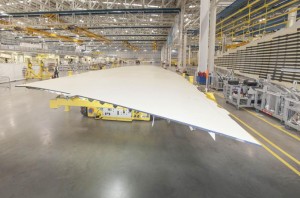Engineers from aerospace giant Airbus’s Filton plant are leading a £17.7m project to develop an innovative way of designing and manufacturing aircraft wings.
The team is working with world-leading engineering and scientific technology firm Renishaw, based near Bristol at Wotton-under-Edge, on the project, which aims to reduce development time. 
With more than 30,000 new aircraft expected to be required in the next 15-20 years as air travel increases and existing planes reach the end of their service life, finding more effective ways of designing and making wings will become crucial to lower costs for manufacturers and raise environmental standards.
Airbus’s Filton plant, which employs 4,000 people, is a global centre of excellence for wing design, development and testing.
The project, called Wing Design Methodology Validation – or WINDY – will look at aerodynamic modelling of wings, the potential for use of complex 3D-printed components in wing structures and the possibility of innovative loads control on aircraft for better efficiency in flight.
It was one of a number of Aerospace Technology Institute (ATI) projects announced by the Department for Business, Innovation and Skills at last week’s Farnborough International Airshow.
The £3.9bn ATI is a collaboration between government and industry, facilitating research and development investments to ensure UK retains a world-leading aerospace sector.
Airbus chief operating officer Tom Williams said: “Aircraft wing design is a hugely complicated process and this project will look at ways we can increase the robustness of the design and test process while also reducing the time this takes.
“Developing state-of-the-art technology will be at the heart of achieving these improvements and this investment is vital for that.”
ATI chief technology officer Simon Weeks added: “One of the key aims of the ATI’s UK national aerospace strategy is to sustain and grow the UK’s global leadership in aircraft wings.
“The WINDY project is a key element of this aim, securing essential wing design and integration capabilities in the UK and opening the way to innovative 3D-printed wing components. These will lead to lighter and more efficient wings, which will be needed for future generations of greener airliners.”
Renishaw is one of the world’s leading companies with expertise in precision measurement and additive manufacture.






























